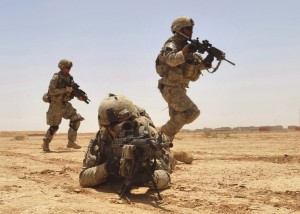 Even though Operation Enduring Freedom – the war to combat terrorism in Afghanistan and across the globe – has officially ended, there are still about 15,000 U.S. troops stationed in Iraq and Afghanistan. All U.S. service members who have served abroad will likely feel the effects of their deployment for decades.
Even though Operation Enduring Freedom – the war to combat terrorism in Afghanistan and across the globe – has officially ended, there are still about 15,000 U.S. troops stationed in Iraq and Afghanistan. All U.S. service members who have served abroad will likely feel the effects of their deployment for decades.
The January issue of the journal Epidemiological Reviews covers the topic of veteran’s health, specifically veterans of our most recent wars. The entire issue is full of meta-analyses about how serving in the U.S. military effects people’s health for years.
Some of the most poignant articles describe the effects of international deployment on U.S. troops. The evidence shows that being deployed with the U.S. military has long-ranging health effects. Among them:
- A systematic review that included 17 studies found that people who served in combat situations were three times more likely to exhibit aggressive or violent behaviors once they returned home compared to service members in non-combat roles.
- Another review found U.S. troops who served in the Gulf, Afghanistan, and Iraq wars were 30 to 40 percent more likely to abuse alcohol compared with troops who were not deployed. They were also more likely to abuse drugs. And a second review on alcohol and drug use found that female veterans were also more likely to have higher rates of alcohol and drug abuse compared with women who did not serve in the military.
- A review of 23 studies found that veterans use cigarette smoking to cope with chronic pain.
- Lastly, a review of 31 studies identified risk factors for homelessness among veterans. They include substance use, mental illness and low income. The review also found that homeless veterans are more likely to be older, better educated, married and insured compared to homeless people who did not serve in the military.
The special edition also includes eight other systematic reviews that look at physical and mental health issues facing veterans. While the topics are complex and multifaceted, the take-home message is clear: deploying with the U.S. military and engaging in combat situations takes a lasting toll on the health of U.S. troops.
It’s likely that veterans of the wars in Iraq and Afghanistan will develop more challenges in the future, said Brian Leidy, Director of Military Projects at Cornell’s Bronfenbrenner Center for Translational Research. That’s because new research shows that, for many Viet Nam veterans, the challenges of dealing with post traumatic stress disorder did not surface until they were in their 60s and 70s.
“The suicide rate for males in their 60s who have served in the military is roughly ten times that of the general population,” Leidy said. “Of the two million U.S. troops who served in Afghanistan and Iraq during the ten years of war, it is estimated that 300,000 returned with PTSD, traumatic brain injury, or major depression. In dealing with the aftermath of the Afghanistan and Iraq wars, there are many reasons to believe the worst is yet to come.”



this series of short films about two vietnam war veterans makes this point on the impacts of military deployment plain.
Part 1: http://youtu.be/CzQ1QaLexpE
Part 2: http://youtu.be/poiJnw6R9vU
Part 3: http://youtu.be/582jzEskUJ8
Fascinating! Thanks, Diane.